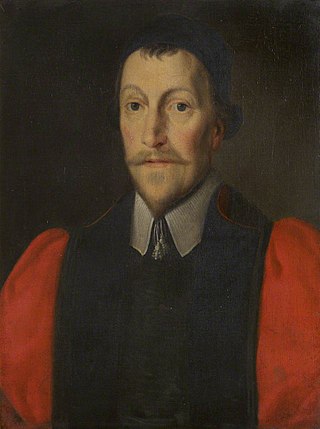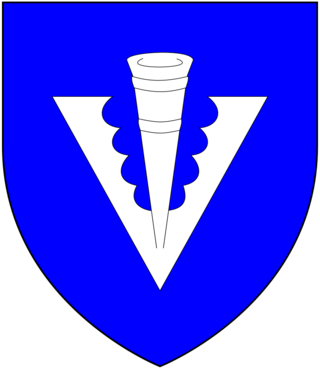Related Research Articles

Matthew Hutton (1529–1606) was archbishop of York from 1595 to 1606.

William Bill was Master of St John's College, Cambridge (1547–1551?), Vice-Chancellor of the University of Cambridge (1548) and twice Master of Trinity College, Cambridge, Provost of Eton College (1558–1561) and Dean of Westminster (1560–1561).

Godfrey Goldsborough was a Church of England clergyman and Bishop of Gloucester from 1598 to 1604. He also served as a Prebendary of Worcester.
James Dugdale was an Oxford academic and administrator. He was Fellow and Master of University College, Oxford.
Robert Some (Soame) (1542–1609) was an English churchman and academic. Master of Peterhouse, Cambridge from 1589, Some played a prominent part in the ecclesiastical controversies of his time, taking a middle course, hostile alike to extreme Puritans and Anglicans.
Walter Haddon LL.D. (1515–1572) was an English civil lawyer, much involved in church and university affairs under Edward VI, Queen Mary, and Elizabeth I. He was a University of Cambridge humanist and reformer, and was highly reputed in his time as a Latinist. He sat as an MP during the reigns of Mary and Elizabeth. His controversial exchange with the Portuguese historian Jerónimo Osório attracted international attention partly on account of the scholarly reputations of the protagonists.

William Beale was an English royalist churchman, Master in turn of Jesus College, Cambridge and St John's College, Cambridge. He was subjected to intense attacks by John Pym from 1640, for an unpublished sermon he had given in 1635 supporting royal prerogative. According to Glenn Burgess, Pym's attention to Beale was because he exhibited a rare combination of Arminian or Laudian theological views with explicit political views tending to absolutism.
Richard Howland (1540–1600) was an English churchman and academic, Master of Magdalene College, Cambridge, and of St John's College, Cambridge, and bishop of Peterborough.
Nicholas Bond (1540–1608) was an English churchman and academic, President of Magdalen College, Oxford, from 1590.

William Stanley (1647–1731) was an English churchman and college head, Master of Corpus Christi College, Cambridge, Archdeacon of London and Dean of St Asaph.
Theophilus Dillingham (1613–1678) was an English churchman and academic, Master of Clare Hall, Cambridge and Archdeacon of Bedford.

William Bradbridge (1501–1578) was an English bishop of Exeter.
John Colbatch, sometimes Colbach, was an English churchman and academic, professor of moral philosophy at Cambridge. Drawn into the long legal struggle between Richard Bentley and the fellowship of Trinity College, Cambridge, he became a chief opponent and spent a short time in prison for a tactless court appearance.
Richard Longworth was an English churchman and academic, Master of St John's College, Cambridge and Dean of Chester.
Francis Babington D.D. was an English divine and an academic administrator at the University of Oxford. He was elected Master (head) of Balliol College, Oxford on 2 September 1559, a post he held until he resigned the following year on 27 October 1560. Babington was Vice-Chancellor of Oxford University from 1560 to 1562. He was also Rector of Lincoln College, Oxford, from 1560 until he resigned in 1563.
Thomas Fowle was a Church of England clergyman, Fellow of St John's College, Cambridge, rector of Redgrave and Hinderclay, Suffolk, and prebendary of Norwich Cathedral.
Thomas Playfere was an English churchman and theologian, Lady Margaret's Professor of Divinity at Cambridge from 1596.
William Saywell (1643–1701) was an English churchman and academic, known as a controversialist, archdeacon of Ely, and Master of Jesus College, Cambridge.
John Pory (1502/03–1570) was an English churchman and academic, Master of Corpus Christi College, Cambridge.
Roger Kelke (1524–1576) was an English churchman and academic, a Marian exile and Master of Magdalene College, Cambridge from 1558 and Archdeacon of Stow from 1563.
References
 This article incorporates text from a publication now in the public domain : Lee, Sidney, ed. (1897). "Sheppard, Nicholas". Dictionary of National Biography . Vol. 52. London: Smith, Elder & Co.
This article incorporates text from a publication now in the public domain : Lee, Sidney, ed. (1897). "Sheppard, Nicholas". Dictionary of National Biography . Vol. 52. London: Smith, Elder & Co.